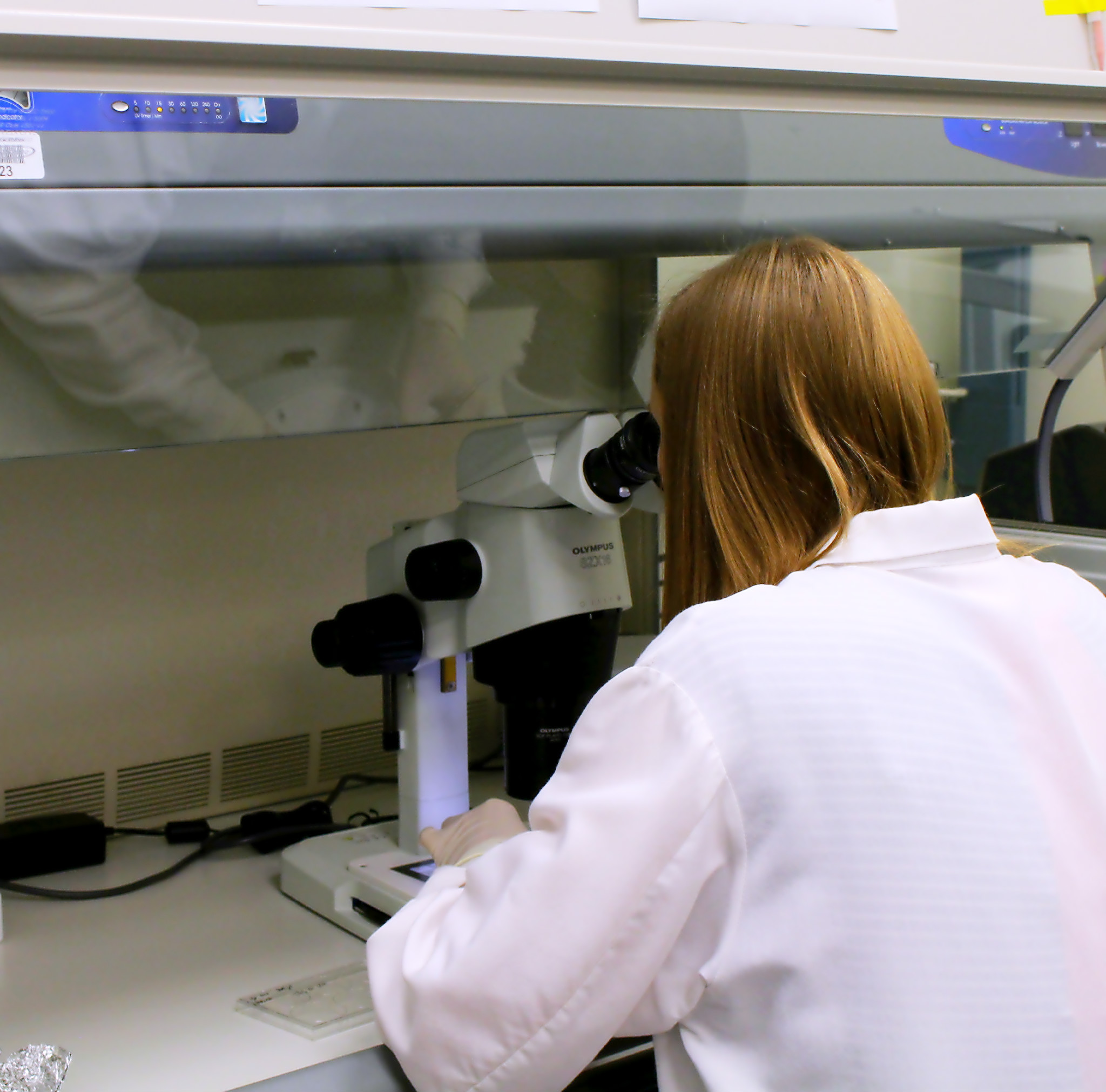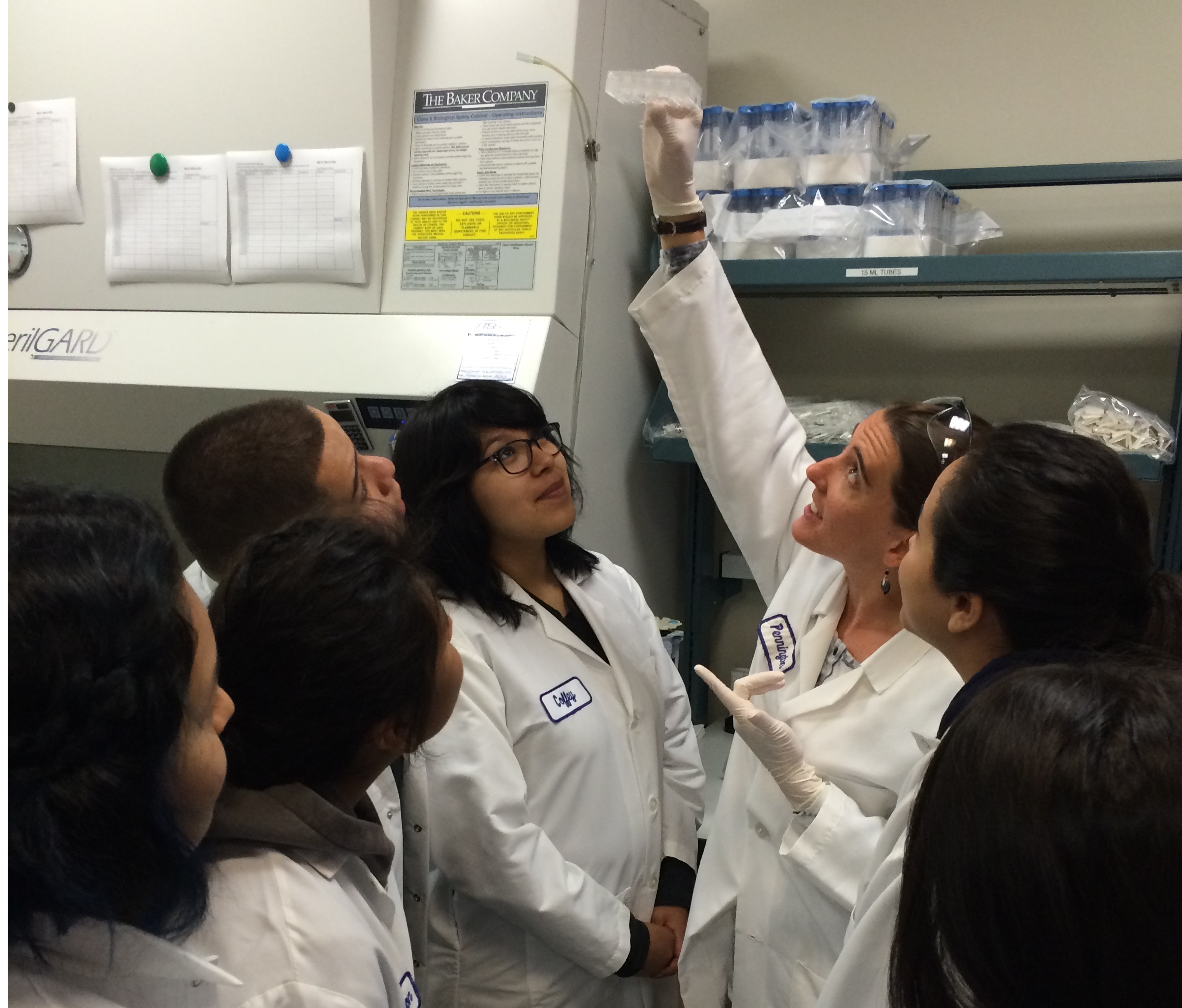Facilities (Laboratory for Stem Cell Biology and Engineering)
The Center for Stem Cell Biology and Engineering occupies ~10,000 sf within the Neuroscience Research Institute (NRI). The NRI is located in the Biological Sciences II building in the Biology/Engineering sector of the UCSB campus on Lagoon Road across the street from the Pacific Ocean. Center space, renovated as part of a CIRM-funded Major Facilities Project, includes research laboratories, offices, meeting rooms, equipment rooms and core facilities. The Clarke-Carbon Conference Room (4164 Bio II) can be reserved for meetings and seminars. Named in honor of Louise Clarke and John Carbon, trailblazing UCSB faculty members whose research in recombinant DNA and centromere biology ushered in the modern era of molecular biology.
 The UCSB Stem Cell Core Facility: The William K. Bowes Jr Laboratory for Stem Cell Biology and Engineering – A CIRM Shared Resources Laboratory
The UCSB Stem Cell Core Facility: The William K. Bowes Jr Laboratory for Stem Cell Biology and Engineering – A CIRM Shared Resources Laboratory
The stem cell core provides training and technical assistance in adult and pluripotent stem cell culture methodologies to both internal and external investigators through a recharge agreement. This state-of-the-art 1400 sf facility, outfitted by a grant from CIRM, is a positive pressure laboratory with a 0.2 micron HEPA filtered air supply. It is equipped with 6 workstations, each with a Baker SterilGARD III laminar flow biosafety cabinet, a Sanyo air-jacketed CO2 incubator, a sterile dissection hood equipped with a Nikon SMZ 1500 dissecting microscope with a heated stage, and an Olympus inverted phase contrast microscope.
This core facility, directed by Mika Katsura and Susanne Meyer (Co-Directors), includes an Accuri C6 Flow Cytometer, an upright epifluorescence microscope, an inverted epifluorescence microscope, centrifuges, and ancillary equipment. Including liquid nitrogen storage containers, corrosive/flammable storage cabinets, refrigerators, freezers, and water baths. Routine mycoplasma testing is performed in- house and karyotyping services are carried out via contract. Nanopure water purification systems, autoclaves, ice/dry ice/liquid nitrogen are readily available. Individual one-on-one training for new investigators is available. We offer two hands-on laboratory training courses: Advanced Stem Cell Techniques and Quantitative Stem Cell-Based Modeling. These courses will be accessible to central coast undergraduates, graduate students, postdoctoral fellows, and researchers in academia and biotechnology. We also offer workshops on Integrated Embryo Models; Brain and Retinal Organoid Models; Spatial Transcriptomics; and Encapsulation and Scaffolding. Please see Training for more information.
Our stem cell core is part of a network of 11 Shared Resources Laboratories (SRLs) for Stem Cell-Based Modeling supported by CIRM. This network of SRLs throughout the state of California shares a broad and powerful range of stem cell expertise, state-of-the-art services and equipment, training, and educational activities. Our SRL has a particular expertise in unique stem cell-based models related to Neural Development and Disease.
Additional Core Facilities
The CNSI Biological Nanostructures Lab provides capabilities and resources to support and enhance interdisciplinary research at the life science and engineering interface. Directed by Dr. Jen Smith, the BNL provides scientific expertise in operating complex, high value instruments, in addition to bioinformatics support and basic services in the areas of molecular biology and biochemistry. This core provides high throughput DNA sequencing to on- and off-campus researchers using the Illumina platform. The versatile NextSeq 500 accommodates RNA-Seq, DNA-Seq, ChIP-Seq or targeted sequencing. Analytical core equipment includes a GE Biacore 3000, a GenePix 4400A Microarray scanner, a Malvern Zetasizer Nano ZS, a Shimadzu UV-1800 Spectrophotometer, and a Tecan M220 Infinite Pro plate reader along with other molecular biology core tools.
The NRI/MCDB Microscopy Facility is equipped for light, confocal, and electron microscopy. This state of the art facility includes fluorescent microscopes, laser scanning confocal, two photon confocal microscopes, a spinning disc microscope, and a transmission electron microscope.
Other core facilities on campus include the Materials Research Laboratory and the Nanofabrication Facility in the College of Engineering. The MRL, an NSF Center, has an annual operating budget of ~$1.5M and maintains over $20 M in advanced instrumentation for microscopy and microanalysis, spectroscopy, materials, polymer chemistry, computing, and x-ray diffraction. The Nanofabrication facility offers expertise in nanolithography, semiconductor-based device fabrication, and thin-film processing. Providing a broad range of processes to the scientific and research communities, including a clean room facility that is self supporting from recharge income. The Department of Chemistry and Biochemistry maintains NMR, Mass Spectometry, and X-Ray facilities.
UC Santa Barbara offers a vibrant, interactive, and interdisciplinary environment for stem cell researchers


